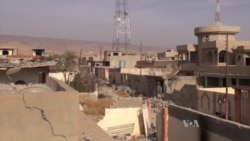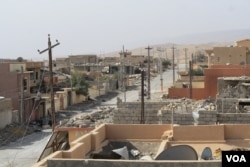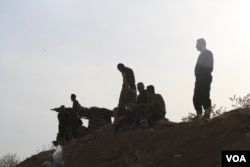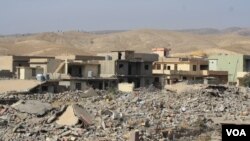Once a bustling Iraqi city and beloved homeland to the Yazidi people, Sinjar lies in ruins. There are no city services and hardly any people.
Few families have returned since peshmerga soldiers captured this city a year ago. Several military groups allied against Islamic State are stationed in the area.
Locals said the initial IS takeover in 2014 was terrifying and swift.
"When they first arrived, they were well-armed because they had already taken Mosul and stolen weapons," said Baran Qasim, a local shop owner. "So when they attacked, our forces had Kalashnikovs [rifles] and IS had heavy artillery."
But worse than the destruction of the beloved center and the loss of treasure for the Yazidis is what the United Nations calls a genocide against the religious minority. And the fear of renewed violence is always present, as peshmerga forces continue to defend the city against IS militants just a few kilometers away.
In the days and months that followed the IS takeover, tens of thousands of people fled the city. Some starved to death, and others committed suicide to avoid the horrors IS was inflicting on the Yazidi people.
Women, girls taken
Among the most terrifying acts was the kidnapping of thousands of women and girls.
"I would rather they have killed me than witnessed what was done to my people," said Naam Farhab, a mother of seven, weeping. "It was more than 3,000 girls and women, even Yazidi children. It is one thing to kill men, but to steal and rape women and girls?"
Heavy fighting slowed only a month ago, and the extremists still occupy about 20 percent of the region, soldiers said.
And for them, the stakes could not be higher.
"IS took the people in groups, killed them and put the bodies in dump trucks," said Talib Naif Jaso, a unit commander for the peshmerga forces. "Even old women. The bodies were thrown in holes along with some people who were buried alive."
He described other horrors and humiliations, such as elderly women being loaded into trucks alive and dumped out like trash. Young women and girls were kidnapped by the thousands and sold as sex slaves across the region.
Locals said they didn't think this ruined city could be rebuilt, and they are sure, in this region of broken hearts, that their lives will be just as difficult to repair.
"My son told me, 'Mom, let's leave and go to Europe,' " said Farhab. "I said, 'No, I will stay in my homeland no matter what.' "
IN PHOTOS: The Horrors of Sinjar









